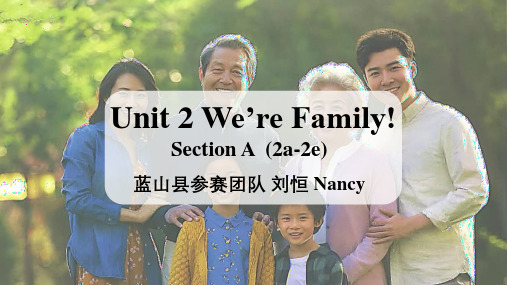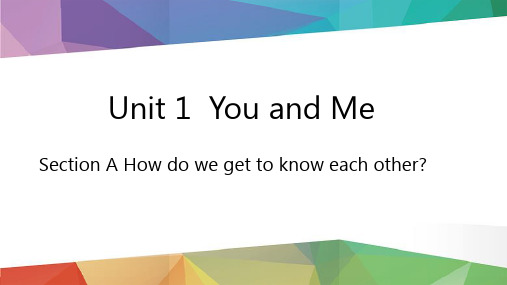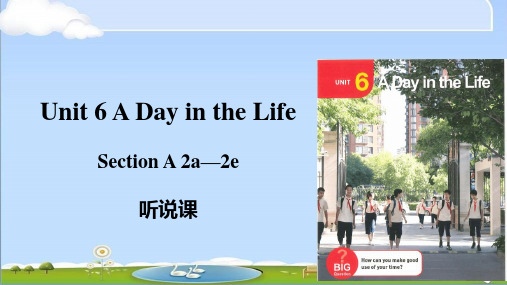人教版英语七上课件第二课时sectiona(2a-2e)
合集下载
人教版英语七年级上册Unit2 SectionA (2a~2e)第二课时课件

Listen and match Whose … is it/are they?
Tip: Pay attention to the key words(关键词).
Teng Fei’s father’s
Teng Fei’s mother’s
Teng Fei’s
Teng Fei’s grandpa’s
Choose to do:
Think about the activities your family can do together to spend time with each other.
Thank you!
piano
Activity (活动) play ping-pong play ping-pong every week spend a lot of time fishing play the piano really well
Share your family
Work in pairs. Talk about things your family members have and the activities they usually do.
Read and complete
Report like this: The ping-pong bat is Teng Fei’s. He often plays ping-pong.
Family member Teng Fei Grandpa Father Mother
Thing ping-pong bat black ping-pong ing-pong bats and a ping-pong ball /ts/
Peter Teng Fei
Listen and circle
人教版英语七年级上册Unit2 SectionA (2a~2e)教学课件

Peter: Whose fishing rods are those?
物品.
Teng Fei: They're my father's. He spends a lot of t-i-mWehofsiseh+in物g品. + is this/that/are
these/those?
Peter: Hey, do you play the piano? 询问物品及家人的喜好
Teng Fei plays ping-pong.
Can you find similar expressions?
2b. Read the conversation and make judgements and correct the mistakes. Write T for True and F for false.
Peter: Do you often play ping-pong together? play+球类 Teng Fei: Yes, we play every day/week. My grandpplaalyo+veths es+po乐rt.器 Peter: Whose fishing rods are those? 钓竿
Unit 2 We’re family!
What is your family like?
Section A (2a-2e)
Learning objectives
通过本课时学习,我们能够:
感知学习一些与介绍家庭成员相关的词组和句式;能够根据已给线索用一般 疑问句来询问或确认物品归属关系,正确运用名词所有格;能够识别区分乐 器名词和运动名词的用法(学习理解)
人教版七年级英语上册Unit2第2课时SectionA 2a—2e课件

Ⅱ.单项选择 6.(人与自我·乐学善学)(2022广西河池中考)I usually spend time B in the library on weekends. A.read B.reading C.reads D.to read 解析 spend time doing sth.,意思是“花费时间做某事”, 故选B。
28.考查动词辨析。根据“they often...them on TV”可知, 此处指的是“在电视上看体育节目”,应用watch,主语是第 三人称复数,动词用原形。故选C。 29.考查形容词辨析。根据上文以及“Mary is the same as Bob.”可知,他们是喜欢运动的,说明运动对他们来说不难。 故选B。 30.考查介词辨析。她和同学们一起运动。故选D。
24.考查冠词辨析。表示球类运动时,不用冠词,play basketball“打篮球”。故选B。 25.考查形容词辨析。根据“He has some CDs and a CD player.”可知,Jack认为音乐很有趣。故选C。 26.考查名词所有格。空处修饰其后的名词,应用名词所有 格形式。故选B。 27.考查连词辨析。空格前后是转折关系,应用but连接。故 选C。
10.(人与自我·体育活动)(2024广西梧州岑溪期末) — C she like swimming?
—Yes, she
.
A.Does;do B.Do;does
C.Does;does D.Do;do 解析 考查实义动词的一般疑问句及答语。句子中有动
词like,且主语she是第三人称单数,所以提问时用助动词does, 肯定回答是“Yes,she does.”。故选C。
do sports in the afternoon.
新教材人教版七上英语Unit1 Lesson 2 Section A (2a-2e)课件

Unit 1 You and Me
Section A How do we get to know each other?
Learning Objectives
In this lesson you will: 1. be able to introduce two strangers to each other; 2. tell the difference between English and Chinese names
Listen to the conversation and circle the coloured words you hear.
Chen Jie: Hello, Mr Smith! Mr Smith: Hello, Chen Jie. How are you? Chen Jie: I’m good / fine, thank you. Mr Smith, this is my new
Mr Smith Country: __t_h_e_U__S____
Job: _E_n_g_l_i_sh__te_a_c_h_e_r_
Peter Class: ___C_la_s_s_1___
Class teacher: _M__s_G__a_o_
Think More
What is the first name of Peter’s class teacher?
and know how to translate Chinese names into English.
Look and Say
Look at the picture. What is the girl in the middle doing?
She is introducing two people to each other.
Section A How do we get to know each other?
Learning Objectives
In this lesson you will: 1. be able to introduce two strangers to each other; 2. tell the difference between English and Chinese names
Listen to the conversation and circle the coloured words you hear.
Chen Jie: Hello, Mr Smith! Mr Smith: Hello, Chen Jie. How are you? Chen Jie: I’m good / fine, thank you. Mr Smith, this is my new
Mr Smith Country: __t_h_e_U__S____
Job: _E_n_g_l_i_sh__te_a_c_h_e_r_
Peter Class: ___C_la_s_s_1___
Class teacher: _M__s_G__a_o_
Think More
What is the first name of Peter’s class teacher?
and know how to translate Chinese names into English.
Look and Say
Look at the picture. What is the girl in the middle doing?
She is introducing two people to each other.
人教版2024新版七英语上Unit 1 课时2 Section A(2a-2e)听说课课件

Chen Jie: Hello, Mr Smith!
Mr Smith: Hello, Chen Jie. How are you?
Chen Jie: I'm good/fine, thank you. Mr Smith, this is my new friend/classmate,
Peter. Peter, this is our English teacher, Mr Smith. He's from the US.
发/e/的单词
发/æ/的单词
发/ɪ/的单词
Lead in How do we get to know each other?
How do we get to know each other?
—Who’s he? —His name is Mark.
He is the boys’ physical education(体育) __te_a_c_h_e_r___.
Mr Smith: Hi, Peter. Nice to meet you.
Peter: Nice to meet you too, Mr Smith.
Mr Smith: What/Which class are you in, Peter?
Peter:
I'm in Class 1.
Mr Smith: Who's your class teacher?
Peter: Ms Hui.
Chen Jie: Oh, Peter, it's Ms Gao, not Ms Hui. Hui is her first name.
Peter: Oh, sorry!/ I'm sorry! My mistake.
【课件】Unit2+Section+A+(2a---2e)课件人教版(2024)七年级英语上册

is where I feel I fit in.
1.He has two _p_in_g_-_p_o_n_g(b乒at乓s 球拍), but he doesn’t have any _v_o_ll_e_y_b_a_ll(排球). 2.They read English _e_v_e_r_y_d_a_y (每天). 3.Mike is my best friend. We often go to school _t_o_g_e_th_e_r_ (在一起). 4.Daming’s mother __s_p_e_n_d_s_ (花费) a lot of money on clothes every year. 5.There are ___lo_t_s___ of (大量) new mobile phones in the shopping mall. 6.Sally __re_a_l_ly___ (真正地) likes ice-cream. She eats it every day. 7.Our school life is interesting. We have many after-school__a_ct_i_v_it_ie_s__to do every day. (活动) 8.On a hot summer morning, an old man is f___is_h_i_n_g_ (钓鱼) near a river. 9.My favourite _s_p_o_r_t___ (运动) is running. 10.The old man is used to playing _C_h_i_n_es_e__ch_e_s_s_ with his friends in the afternoon. (中国象棋)
Let's listen 2c Listen to the conversation again. Then role play it.
1.He has two _p_in_g_-_p_o_n_g(b乒at乓s 球拍), but he doesn’t have any _v_o_ll_e_y_b_a_ll(排球). 2.They read English _e_v_e_r_y_d_a_y (每天). 3.Mike is my best friend. We often go to school _t_o_g_e_th_e_r_ (在一起). 4.Daming’s mother __s_p_e_n_d_s_ (花费) a lot of money on clothes every year. 5.There are ___lo_t_s___ of (大量) new mobile phones in the shopping mall. 6.Sally __re_a_l_ly___ (真正地) likes ice-cream. She eats it every day. 7.Our school life is interesting. We have many after-school__a_ct_i_v_it_ie_s__to do every day. (活动) 8.On a hot summer morning, an old man is f___is_h_i_n_g_ (钓鱼) near a river. 9.My favourite _s_p_o_r_t___ (运动) is running. 10.The old man is used to playing _C_h_i_n_es_e__ch_e_s_s_ with his friends in the afternoon. (中国象棋)
Let's listen 2c Listen to the conversation again. Then role play it.
新人教版英语七年级上册 Unit 6 第二课时 Section A 2a-2e

询问时间(what time与when)
➢ 对时间的提问一般用when和what time。 ◆具体用法 1.when是疑问副词,意为“什么时候,何时”,用于对日期(某年、某月、某日)提问。 eg:When are you going to leave Shanghai?你们打算何时离开上海?
When were you born?你何时出生的? 2.当询问某年某月某日的上午、下午、晚上等某个具体时刻钟点时,用what time。当 泛指“做某事的时间”时,when和what time一般可互换。
3.when还表示“当……的时候”,而what time无此意思。 eg:I was reading a book when my mother got home.
妈妈到家时我在读书。 4.what time用来对某个时间提问,希望知道的时间比
when更具体。 eg:—What time do you get up in the morning? 你早上几点起床? —About six.大约6点。 What time does the shop open?这个商店几点开门?
• 1)询问做某事的具体时间(钟点)时,可用___w___h_a_t__t_i_m或e
_____w_h__e_n__提问。
• 2)询问事件(月份、星期、日期)等非钟点时间时只能用_______。
• 3w)h询en问钟表所表示的具体时间(钟点)时,只能用__w__h__a_t__t_i_m。e
填空:
1) --___W__h_a_t__ti_m__e__ do you eat breakfast?
2c Read again and complete Tom’s school day routine.
人教版七年级英语上册Unit2第二课时SectionA 2a—2e课件

Ⅲ.根据汉语意思完成句子,每空一词
11.我们的房子很大,里面有许多家具。 Our house is really big. There is a lot of
furniture
in it.
12.那位老人喜欢拉二胡。 The old man likes to play the erhu .
13.我哥哥喜欢游泳。他每天都去游泳。 My brother likes swimming. He goes swimming every day .
解析 [语篇解读] 本文作者介绍了自己和家人。 16. 根据其后提到的“我的姓氏”可知,所缺的句子是C,该句 介绍了“我的名字”。 17.根据设空处前的“Look!”及设空处后提到的家人可知, 所缺的句子是B。 18.根据其前的“她是我们学校的一名英语老师”可知,所缺 的句子是E。
19.根据其后的“他们喜欢打篮球”可知,所缺的句子是A。 20.此处所缺的句子是总结句,根据其前提到的家人信息 可知,所缺的句子是D。
less time on the phone at night, or you will find it hard to fall aslee p.
4.Lily lives next to my house, so we often go home together (一起). e and look at my new piano (钢琴). It looks nice and it' s from my father.
Ⅱ.用所给词的适当形式填空 6.The black cap is my grandfather’s (grandfather) because
black is his favorite color.
- 1、下载文档前请自行甄别文档内容的完整性,平台不提供额外的编辑、内容补充、找答案等附加服务。
- 2、"仅部分预览"的文档,不可在线预览部分如存在完整性等问题,可反馈申请退款(可完整预览的文档不适用该条件!)。
- 3、如文档侵犯您的权益,请联系客服反馈,我们会尽快为您处理(人工客服工作时间:9:00-18:30)。
二、用括号中所给单词的适当形式填空。 6.This is ______ (Ben) computer. Ben's birthdays 7.My parents' __________(birthday) are in December. 8.How old ____ (be) your parents? are 9.The _____(one) day of July is my birthday. first 10. _______________ Anna and Tom's(Anna and Tom) father is Mr. Miller.
( )12. —Happy birthday to you! A
( )14.Please come to my birthday dinner ________ seven this evening. C
A.in B.on C.at
B ( )15. —Today (今天) is my birthday.Do you want ________ to my birthday party?
三、单项选择。
C ( )11. —________ is your brother?
—He is seven. A.How —________ A.Thank you! C.Happy birthday to you! ( )13. —Is Linda's grandma very ________? C —Yes.She is 85this year. A.interesting B.small C.old B.Yes,it's my birthday. B.How much C.How old
如:She plays sports at seven.她七点做运动。
►See you!再见! 其同义句为:Goodbye!/Bye!
一、根据句意及汉语提示完成下列单词。 1.The _____ old(年老的) woman is my grandma. 2.Jenny looks very ________( happy高兴的) these days. party 3.You can meet Mr. Brown at the _______( 聚会). months月). 4.A year (年) has twelve ________( April 5.Frank wants to go to China in ______( 四月).
Unit 8
When is your birthday?
第二课时
Section A (2a-2e)
►Happy birthday!生日快乐! ①happy形容词,意为“愉快的,高兴的”。 be happy for sb.为某人感到高兴 be happy with/about sb./sth.对某人/某事满意 be happy to do sth.高兴做某事 ②Happy birthday!其完整形式为Happy birthday to you!其中to you可以 省略,答语应表示感谢。
►—How old are you?你多大了?
—I'm thirteen.我十三岁。
①这是询问年龄的常用句型,其同义句是:What's your age? ②I'm thirteen.回答“How old...?”的句型通常为“主语+谓语+基数词
(+years old)”,所以I'm thirteen.是简略形式。
B:Sure. Thanks.
A.Whenisherbirthday?
B.Howoldareyou?
C.Happybirthday! D.When'syourbirthday?
E.MybirthdayisonOctober 10th.
F.Howaboutyou? G.Doyouhaveabirthdaypen.17.____F
A:Twelve.18.____ D B:It's on March 5th.And you?
A:19.____ E
B:Oh,it's coming.20.____ G A:Yes,I do. Would you like to come to my party?
如:How old is your brother?=What's your brother's age?你哥哥多大? 回答:He is nineteen(years old).他19岁了。
③在讲英语的国家中,年龄、收入、婚姻状况等被认为是个人隐私,因
此在涉及这些话题时,一定要三思而后问。
►At three this afternoon.今天下午三点。 英语中,表示某一具体时刻,须用介词at。
—Yes,I do.(易错题)
A.come B.to come C.comes
四、从方框中选择合适的选项补全对话。(有两项多余)(原创题)
A:Hello. My name is Lisa.
B:Hi,I'm Lei La. Nice to meet you. A:Nice to meet you,too.16.____ B
